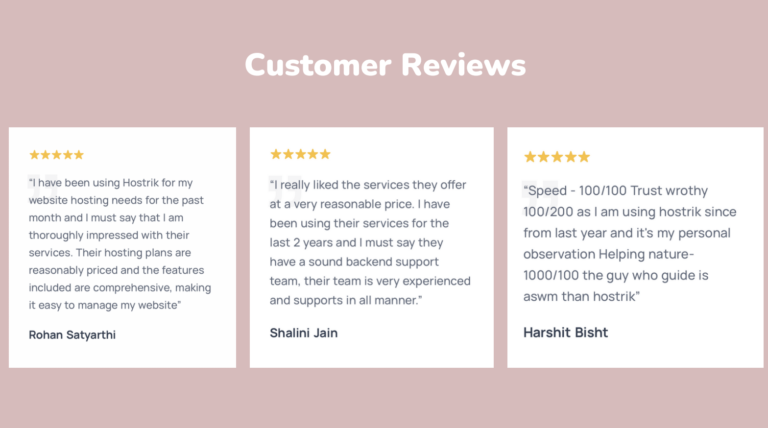Improved web hosting for website developers – 4 things to consider
Welcome to the ultimate guide to web hosting for website developers! In today’s digital age, where websites have become the backbone of businesses and online presence, choosing the right web hosting provider is crucial.
In this comprehensive blog, we will delve into the world of web hosting, exploring various hosting types, key factors to consider, and how to optimize your website for better search engine rankings. Additionally, we will showcase how Hostrik’s cutting-edge services align with these requirements, ensuring a seamless hosting experience.
Section 1: Understanding Web Hosting
Before diving into the different types of web hosting, it’s essential to grasp the fundamental concept of web hosting itself. Web hosting is a service that enables individuals or organizations to publish their websites on the internet. In simpler terms, web hosting acts as a storage space for all your website’s files, ensuring they are accessible to internet users at all times.
To fully understand the intricacies of web hosting, we need to explore the various hosting types available. Each hosting type offers unique features, advantages, and limitations, catering to different website requirements. In the following section, we will discuss shared hosting, virtual private server (VPS) hosting, dedicated hosting, and cloud hosting in detail.
Section 2: Types of Web Hosting

a. Shared Hosting: Shared hosting is an excellent starting point for many website developers, especially those with limited budgets or small-scale projects. In shared hosting, multiple websites share resources (such as disk space, bandwidth, and processing power) on a single server. This setup allows hosting providers to offer cost-effective solutions. However, since resources are shared, performance can be affected if other sites on the same server experience spikes in traffic or resource usage.
b. Virtual Private Server (VPS) Hosting: VPS hosting bridges the gap between shared hosting and dedicated hosting. It involves partitioning a physical server into multiple virtual servers, with each website allocated dedicated resources. VPS hosting offers greater control, flexibility, and scalability compared to shared hosting. It also provides improved performance and reliability, as the resources are not shared among websites.
c. Dedicated Hosting: Dedicated hosting offers the highest level of control and performance. With dedicated hosting, you have an entire physical server at your disposal, which means all resources are dedicated to your website. This type of hosting is ideal for large-scale projects with high traffic volumes or websites that require extensive customization.
d. Cloud Hosting: Cloud hosting leverages the power of multiple interconnected servers, forming a virtualized infrastructure. This distributed network ensures high reliability, scalability, and flexibility. In cloud hosting, resources are allocated on-demand, allowing you to scale your website seamlessly as traffic fluctuates. It also offers enhanced security measures and reduces the risk of downtime due to hardware failures.
Section 3: Key Considerations for Website Developers
As a website developer, several key factors should be taken into account when selecting a web hosting provider. Let’s explore these factors in detail:
a. Performance and Reliability: A fast-loading website is crucial for retaining visitors and providing a positive user experience. Look for a hosting provider that offers solid-state drives (SSDs) for storage, as they significantly improve website loading times. Additionally, ensure the hosting provider has a robust network infrastructure and utilizes the latest technologies to maximize uptime and minimize server downtime.
b. Scalability: Your website’s hosting needs may change over time. It’s essential to choose a hosting provider that offers scalability options, allowing you to easily upgrade or downgrade your resources as your website grows or experiences changes in traffic patterns. Scalability ensures that your website can handle sudden spikes in traffic without performance degradation.
c. Security Measures: Website security is of paramount importance to protect your data and your visitors’ information. Choose a hosting provider that implements strict security protocols, such as firewalls, malware scanning, DDoS protection, and regular backups. Look for providers that offer SSL certificates to encrypt data transmission and secure sensitive information.
d. Technical Support: Reliable technical support is crucial, especially when unforeseen issues arise. Opt for a hosting provider that offers 24/7 customer support through multiple channels, such as live chat, phone, or email. Prompt and knowledgeable assistance can save you time and frustration when facing technical challenges.
Section 4: Optimizing Your Website for SEO

Building a website is just the beginning; optimizing it for search engines is key to driving organic traffic and improving its visibility. Here are some essential SEO considerations for website developers:
a. Website Speed Optimization: Website loading speed is a crucial factor that affects both user experience and search engine rankings. Choose a web hosting provider that offers high-speed servers, content delivery networks (CDNs), and caching mechanisms to ensure quick page loading times. Optimize images and use efficient coding practices to further improve speed.
b. Mobile-Friendly Design: With the increasing use of smartphones and tablets, having a mobile-friendly website is no longer optional. Ensure your website is responsive and adapts seamlessly to different screen sizes. Responsive design not only improves user experience but also boosts your search engine rankings, as search engines prioritize mobile-friendly websites.
c. SSL Certificates and HTTPS: Security is an essential aspect of SEO. Implementing SSL certificates and enabling HTTPS on your website not only ensures secure data transmission but also enhances your search engine rankings. Many hosting providers offer free SSL certificates, simplifying the process of securing your website.
d. Website Structure and Navigation: A well-organized website structure and intuitive navigation are crucial for both users and search engines. Create a logical hierarchy and use descriptive URLs, headers, and internal links to help search engines understand your website’s content. User-friendly navigation improves user experience and encourages visitors to explore your site further.
e. Content Optimization: Optimizing your website’s content is a fundamental aspect of SEO. Conduct keyword research to identify relevant and high-ranking keywords for your industry. Incorporate these keywords naturally into your website’s content, including titles, headings, paragraphs, and image alt tags. High-quality, informative content that adds value to your visitors is more likely to rank well in search engine results.
Section 5: Hostrik: The Perfect Web Hosting Partner
When it comes to web hosting for website developers, Hostrik emerges as an ideal partner. Let’s explore the key reasons why Hostrik stands out:
a. Lightning-Fast Performance: Hostrik utilizes state-of-the-art infrastructure, including SSD storage, powerful servers, and optimized network connectivity. This ensures exceptional website loading speeds, contributing to an excellent user experience and improved search engine rankings.
b. Scalable Infrastructure: Hostrik offers scalable hosting solutions, allowing you to effortlessly upgrade or downgrade your resources based on your website’s requirements. Whether you experience sudden traffic spikes or need additional storage, Hostrik ensures your website remains highly available and performs optimally.
c. Robust Security Features: Hostrik prioritizes website security, implementing comprehensive measures to protect your data and your visitors’ information. With features like firewalls, malware scanning, DDoS protection, and regular backups, Hostrik safeguards your website from potential threats and vulnerabilities.
d. 24/7 Expert Support: Hostrik’s dedicated support team is available 24/7 to assist you with any technical issues or concerns. Their knowledgeable and responsive support staff ensures quick resolution of problems, minimizing downtime and keeping your website running smoothly.
e. SEO-Friendly Hosting Features: Hostrik understands the importance of SEO for website developers. Their hosting services include advanced features, such as high-speed servers, content delivery networks (CDNs), and free SSL certificates. These features contribute to improved website performance, security, and search engine rankings.
Conclusion
Choosing the right web hosting provider is a crucial decision for website developers. By understanding the different types of web hosting, considering key factors, and optimizing your website for SEO, you can ensure a solid foundation for your online presence.
Hostrik emerges as a reliable and feature-rich hosting partner, offering lightning-fast performance, scalable infrastructure, robust security measures, 24/7 expert support, and SEO-friendly hosting features. With Hostrik’s exceptional services, website developers can focus on creating remarkable websites while enjoying the benefits of reliable and high-performing web hosting.
Remember, selecting the right web hosting provider is an investment in your website’s success. With Hostrik by your side, you can unleash the true potential of your website and propel your online presence to new heights.







